In brief: Summer continues to unfold in all its richness. (This is actually code for highly variable weather and a flurry of increasingly urgent meetings, but still.) Marco, Justin and I continue to work on Low2No, including several meetings with Sauerbruch Hutton, Arup and Experientia, as well as the local client body. I talked to Monocle about some of the related challenges facing Helsinki in terms of these and other redevelopments. Bryan heads off to the US for a series of catch-up meetings and book edits, initially in New York before joining forces with Justin in Boston. And while the cats are away, Marco and I have a good first planning session on what a 'Helsinki Design Lab 2012' might be.
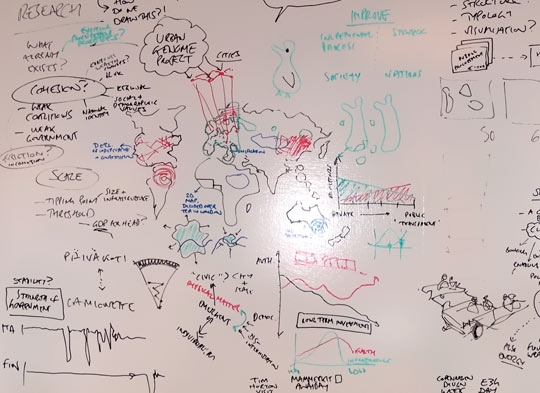
Further: After a few hours of Marco and I whiteboard hacking on Thursday morning, the place is a mess of intriguing scribbles—graphs, maps, arrows, and various molecular diagrams.
While it's too early to describe an emerging agenda for the next iteration of HDL—Marco likened the process to taking the old machinery out of the barn—there are some firm ideas coalescing, particularly around how what governments and governance mean in a world of weak coalitions and apparently dissolving certainties. That's what the scribbles allude to, and both Marco and I are quietly excited by the potential in the directions appearing on the board.
Next week we'll start to unpack these starting points as a team, such that we can begin to develop both a line of enquiry and a plan of attack. We have a loose-fit timeline emerging, which feels good, sketching out a busy year ahead.
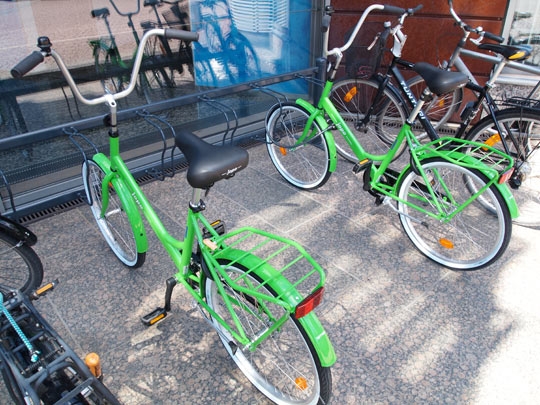
Elsewhere: Sitra now has a couple of Jopo bikes for staff use to get to/from meetings. Jopo are a great Finnish design-and-build story, originally from the mid-1960s, and certainly ready for a little more international attention. The name 'Jopo' comes from JOkaisen POlkupyörä, meaning 'everyone's bicycle'. Originally exemplifying the flatness of Finnish society—a kind of "collective individualism", in their words—the design was resurrected in the 2000s, building upon its easy, vibrant, 'everyday industrial design', based around standard, modular frameworks that are fast to modify and personalise. So, a design-to-manufactured system emphasising the collective that is capable to bending to the individual. A lot of metaphors to play with here. In the meantime, a good healthy way to get to meetings.
One such meeting this week was with Jenna Sutela from OK/Do, a local design-think-tank of some repute. Bryan's previously written about the excellent Clues to Open Helsinki cards produced by OK/Do, Sitra and others last year—a gently inspirational project for many of us working in urban strategy. And before my formal involvement with Sitra, I also attended a great discussion they organised last year as part of their OK Talk series, which featured Bryan, Hanna Harris (The Finnish Institute in London), Amanda Levete (AL_A), Shohei Shigematsu (OMA NY) and Nene Tsuboi (NOW for Architecture and Urbanism). At SIS Deli, Jenna and I talked about the work they'd done with the Oivallus project on the future of education and work in a networked economy as well as their lovely new book OK Talk Helsinki-London, of which more later.
We also discussed how small creative firms here seem to have trouble locating good premises, despite there being space available. We thought there might be room for a stackd-like system at an urban scale, that understood—in a Renew Newcastle sense—how the more fluid firms might be able to occupy space, and matched spaces with uses accordingly. We'd certainly be interested in hearing about any examples of such systems.
And though the Anglo-Saxon in me is horribly aware of all the talk of holidays in recent weeknotes, but this particular week happened to coincide with Juhannus, the Midsummer holiday, and so another mention is unavoidable. Given its intensely seasonal nature, and the relatively brief duration of summer, the importance of Juhannus to Finland can hardly be overestimated, and after a brief storm on Thursday night some of us were treated to a long weekend of bright warm sun and long, light nights, perfect for puttering around islands in small motorboats, sauna and swimming in the gentle if frightfully cold Baltic, and big communal dinners of smoked fish and new potatoes.

As a result, all thoughts of systemic change kept returning to local food systems, producing sustainable versions of communal firewood-burning saunas en masse, and creating low-carbon mobility systems between the Nordic region's cities and their distributed footprint of summer houses. Governance will have to wait.
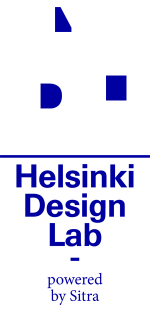
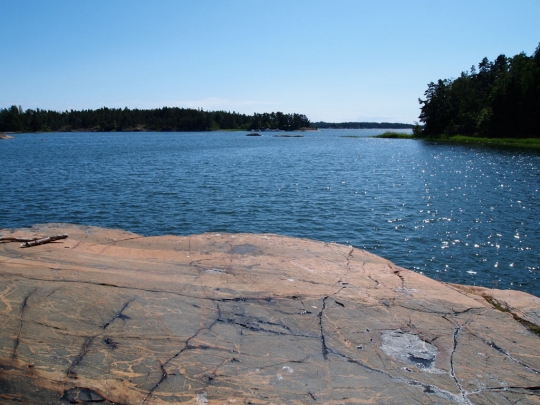
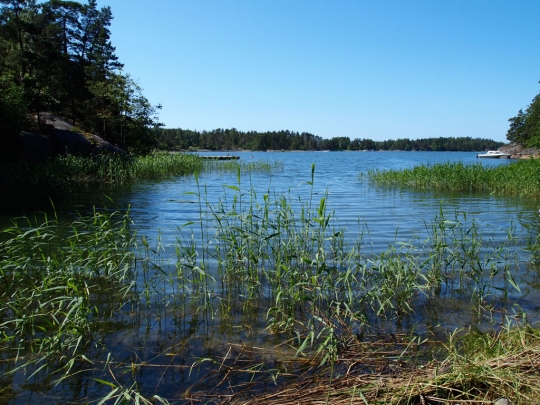


Nice talking to you, Dan!
Re: locating spaces for small-scale cultural activities, Ville Tikka recently mentioned this initiative in NYC: http://www.nolongerempty.org/.
As a continuation to Clues to Open Helsinki, we're actually planning a residency project with OK Do, where we'll turn empty spaces in cities into places for site-specific events and temporary studios for our peripatetic practice. The idea is to become something like a mobile cultural institute in the process; starting up different projects – whatever seems relevant at the time and in that particular area – and aiming to set an example for more residential activities to come. We recently found the first space in Helsinki (more info to follow soon) through asking around. However, hopefully the project will instigate some kind of a system for matching available spaces with interesting uses here.
posted by Jenna — 4 weeks ago